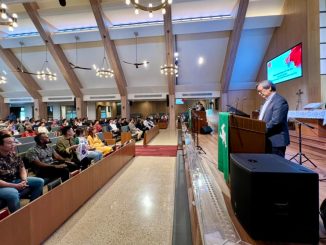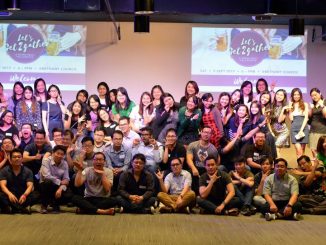
A few months ago, we published an article about the great importance of unity among our spiritual brethren especially in the Last Days. We are very encouraged to see that since 2016 the Malaysian Church has seriously taken up the call and commitment for prayer and unity at the start of every year by regularly having a prayer service attended by the Kuala Lumpur churches during the Week of Prayer for Christian Unity from 18 to 25 January. (Read the report on 2024’s Week of Prayer for Christian Unity).
Recently, a fellow brother in Christ, Elder Steven Fung, shared with us that the global community of churches made a historical breakthrough for Christian Unity in 2017 with the process of reconciliation which had in fact begun from way back in 1999. We both felt that this event would be a great encouragement to all readers of Christianity Malaysia who have a deep yearning for Christian unity.

The World Council of Churches (WCC) and World Communion of Reformed Churches (WCRC) hails Wittenberg declaration as they aim to overcome Reformation divisions in 2017
In July 2017, The World Council of Churches (WCC) welcomed the signing of two ecumenical statements by the World Communion of Reformed Churches (WCRC). Through these ecumenical statements, the WCC and WCRC seek to overcome divisions of the past and to work with other Christian communions for unity and a common witness.
The President of the World Communion of Reformed Churches had remarked at the beginning of the ceremony on 5 July 2017, that the day marked a momentous event in the Church history. The ceremony was held in Wittenberg, well-known as the city where Martin Luther once lived and worked, and in the very same church where he nailed his 95 Theses. The year 2017 also marked the 500th anniversary of Luther’s denunciation of the church corruption in his 95 Theses, an event that helped set in motion the Reformation and centuries of divisions between the Protestants and Catholics.


Through the ceremony, the WCRC formally associated itself with the Joint Declaration on the Doctrine of Justification. Earlier in 1999, the Lutheran World Federation (LWF) and the Roman Catholic Church had reconciled with each other through the signing of the declaration. In essence, the Joint Declaration on the Doctrine of Justification stated that mutual condemnations pronounced by Lutherans and Catholics during the Reformation do not apply to their current teaching on justification.
Bishop Brian Farrell, secretary of the Vatican’s Pontifical Council for Promoting Christian Unity expressed during the ceremony that “Catholics and Lutherans stated that a ‘consensus in basic truths exists between Lutherans and Catholics’ in regard to the theological controversy with was a major cause of the split in the Western church in the 16th century”
Following the Lutherans, the World Methodist Council (WMC) also affirmed the same declaration in 2006. The Anglican Consultative Council affirmed the declaration in 2016.
The Rev. Dr Mary-Anne Plaatjies van Huffel, the WCC president for Africa said, following the signing of the two documents at the service in Wittenberg’s Stadtkirche (Town Church), that “These [ecumenical] declarations are two concrete expressions of the pursuit of full communion and common witness to the world, which is the will of Christ for all Christians”. Support was offered by the Orthodox and Mennonite representatives.
As Reformed, Catholic, Lutheran and Methodist representatives signed a statement confirming the WCRC association’s with the joint declaration, the entire congregation at Wittenberg’s Stadtkirche (Town Church) broke into spontaneous applause.


The Rev. Najla Kassab from Lebanon in her sermon at the service in the Stadtkirche, where Luther used to preach, expressed “Today we are not only signing a statement, we are building a church together”.
The WCRC groups more than 225 Protestant churches with a combined membership of about 80 million Christians in Congregational, Presbyterian, Reformed, United, Uniting and Waldensian churches in over 100 countries. Its offices are in Hannover, Germany.
Elder Steven Fung shared that it is important in the Church’s reconciliation process to know that the Pope had earlier made a public apology in 2015 to the Waldensians, who were the first Evangelical Christians, as a mark of his heart for reconciliation and Christian unity.
“I ask your forgiveness for the unchristian-like and even inhuman attitudes and conduct which, historically, we have had against you. In the name of our Lord Jesus Christ, please forgive us” Pope Francis apologised during his visit to a Waldensian Church in Turin on 22 June 2015. This was the first-ever visit of a Roman pontiff to a Waldensian Church.

Locally, in Malaysia, ecumenical and unity efforts of the churches have been encouraged frequently through the efforts of the Christian Federation of Malaysia (CFM). The Malaysian churches meet as one Body of Christ at the CFM. The 3 members of CFM are the Catholic Church in Malaysia, the Council of Churches Malaysia (CCM) and the National Evangelical Christian Fellowship (NECF). CCM represents the mainline churches in Malaysia (https://ccmalaysia.org), while the NECF represents the congregational churches in Malaysia (https://www.necf.org.my). Altogether, CFM represents some 95% of Christian in Malaysia.
The Christian Federation of Malaysia and Christianity Malaysia feel and believe that it is vital for the health of the Church as the Body of Christ that we remain united and that we continue to encourage and foster efforts towards unity as one family in Christ, especially in these challenging days. (Read about one such effort during our last Malaysia Day here).

Christianity Malaysia would like to thank Elders Steven Fung and Mok Cheh Liang for their kind hospitality and help throughout the production of this article. All photos at the All Saints’ Church in Wittenberg kindly contributed by Elder Mok.
|Share The Good News|




Leave a Reply